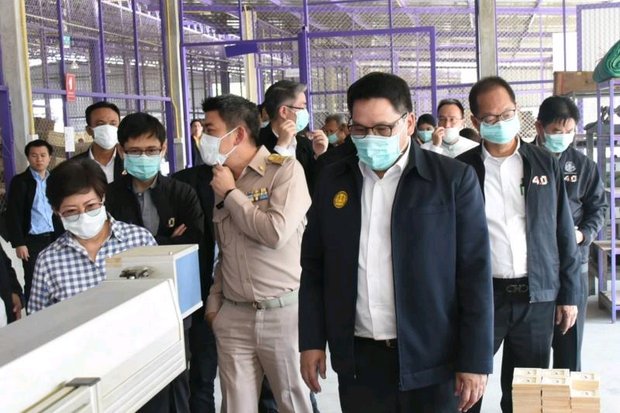
The Industry Ministry has ordered all agencies under its umbrella to set stricter measures governing factories producing high levels of fine dust in Bangkok, and it plans to take legal action against any that exceed established pollution limits.
Industry Minister Uttama Savanayana said he will establish a working group to address the dust pollution problem and further investigate industrial operations that may be the source of any pollution problems.
He called for inspections of factories across the nation, especially 14,000 that use solid fuel boilers and those with high dust emissions, such as stone mills, asphalt plants and cement factories.
This will give the provincial industrial administration the authority to prosecute factories found guilty of producing high dust emissions, such as those above 2.5 microns (PM2.5).
The ministry has taken serious action to control the manufacturing and operation of 140,000 factories nationwide for their pollution in a bid to control the country's air quality.
Category 2 and 3 factories, registered during 2008-17, must comply with laws about the release of pollution.
"The ministry will hold inspections of all factories in Thailand and take legal action if high levels of pollution are found," Mr Uttama said.
The Industrial Works Department and Provincial Industry Offices nationwide are monitoring and providing updates about the air quality in high-risk locations and reporting findings to the ministry every day.
In a related development, the Energy Ministry plans to meet this week with oil refinery operators in Thailand to discuss the possibility of upgrading refined oil to meet higher EU environmental standards, or Euro 5, to improve air quality.
The meeting will include the downstream petroleum regulator, the Energy Business Department and all six oil refiners.
Nantika Thangsuphanich, the department's director-general, said the move is a long-term measure to improve Thailand's air quality from the current Euro 3 and 4 standards.
"It will take time to prepare for Euro 5 because oil companies need capital expenditure to upgrade production facilities, so it could not be implemented immediately," Ms Nantika said.
The Euro standards measure the quantity of substances (dust, sulphur, ozone, polyaromatic hydrocarbons, etc) emitted by engines.
For instance, under Euro 5, sulphur levels are set at 10 parts per million, compared with 50 PPM under Euro 4.
The upgrade to Euro 4 began in 2012 and will be fully implemented by 2022, costing refiners 10 billion baht in investment. Euro 5 may require 30 billion baht, Ms Nantika said, and could raise retail oil prices by 0.50-1 baht per litre.
Ms Nantika said the meeting will raise the issue of the readiness of all operators for Euro 5.
According to the ministry's report, three oil refiners (Bangchak Corporation Plc, Thai Oil Plc and PTT Global Chemical Plc) are ready for Euro 5, while the other three companies (Esso Thailand, IRPC Plc and Star Petroleum Refining Plc) are not.
Hong Kong and Japan are currently the only jurisdictions in Asia to implement the Euro 5 standard.